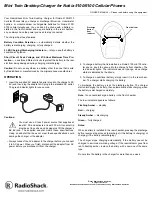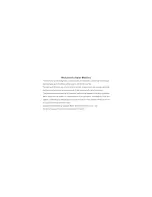
General
UDACT Instruction Manual PN 50050:H 09/16/2002
75
Appendix C: System 500
General
The UDACT is capable of reporting a maximum of 56 zones when used with the System 500. It reports
alarms and troubles on inputs and reports only troubles on outputs. Beware of 'gaps' in the reporting of
input circuits. The gaps depend upon the mounting location and FACP configuration. The System 500
has a maximum of 16 inputs.
For more information on the System 500 see the
System 500 Instruction Manual
.
Mounting
Since the System 500 cannot accommodate the UDACT in the control panel enclosure, the UDACT
must be mounted remotely using an ABS-8R
or UBS-1 enclosure placed within 6000 feet
(1828.8 meters) of the control panel. Refer to "Remote Installation" on page 22 for installation
instructions.
Wiring
CAUTION:
Remove all power from the control panel by disconnecting AC and batteries
before
making any connections to prevent personal and/or circuit damage.
Connections
Refer to Figure 18 on page 76.
Connect the communication line between the EIA-485 terminal block on the System 500 and TB-1
terminals 3 and 4 on the UDACT, being certain to observe polarity.
If last devices or no other devices are connected to the EIA-485, install a 120 ohm EOL resistor
(PN 71244) across UDACT TB1 terminals 3 and 4.
Connect the
Ground Wire (PN 71073, provided)
from the UDACT
EARTH
terminal on TB3 to a solid
building earth ground.
Connect 24VDC filtered, non-resettable power from MPS-24BPCA (Main Power Supply) to TB1
terminals 1 and 2 on the UDACT.
Notes:
1. Ferrite cores, PN 29090, are recommended for all applications.
2. Recommended wire is 12 AWG (3.25mm
2
) to 18 AWG (0.75mm
2
) twisted pair, shielded cable.
Connect only one end of shield: a) shield may be connected to cabinet (earth ground) at fire alarm
panel, or b) shield may be connected to TB1 Terminal 5 (Shield) at UDACT as shown in Figure 18.
Note:
The shield end that is not connected should be insulated to prevent accidental grounding. Do not connect both
ends of shield under any circumstance since a ground fault may result.
3. Conduit is recommended for external wire runs. Consult local building codes.
4. Refer to "Specifications" on page 13 for power requirements.
!
Technical Manuals Online! - http://www.tech-man.com
















































